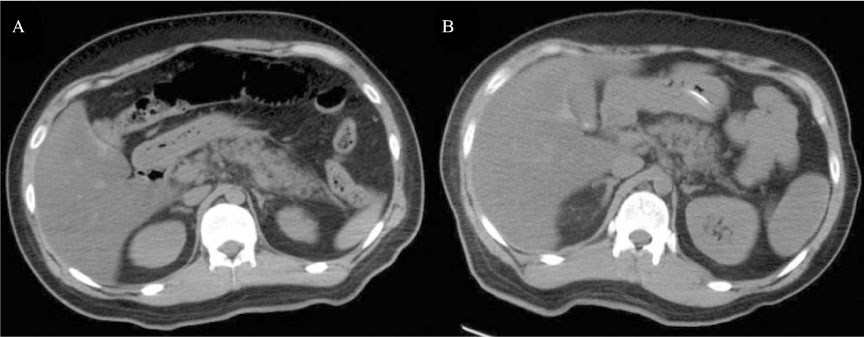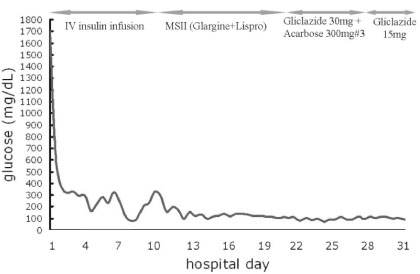J Korean Endocr Soc.
2007 Oct;22(5):376-380. 10.3803/jkes.2007.22.5.376.
Diabetic Ketoacidosis in a Patient with Long-term Clozapine Therapy
- Affiliations
-
- 1Department of Internal Medicine, The Catholic University of Korea.
- KMID: 1523109
- DOI: http://doi.org/10.3803/jkes.2007.22.5.376
Abstract
- With the broad use of atypical anti-psychotics, altered glucose metabolism has become an item of concern to clinicians and patients. Among the atypical anti-psychotics, clozapine and olanzapine are associated with a relatively high incidence of diabetic ketoacidosis and newly developed diabetes. We report a case of diabetic ketoacidosis in a patient with long-term clozapine therapy. A 35-year-old male with schizophrenia, treated with clozapine for 9 years was admitted into hospital because of comatous mentality. Although never diagnosed with diabetes before, his clinical features were consistent with diabetic ketoacidosis and shock. The patient's serum amylase and lipase levels were elevated and an abdominal computed tomography showed peripancreatic fat infiltration, suggesting the possibility of acute pancreatitis. The patient's serum glucose levels normalized shortly after clozapine treatment. Moreover, the patient ceased all glucose lowering agents upon hospital discharge, and maintained normal blood glucose levels thereafter. As observed in this case, clinicians should carefully screen and monitor blood glucose levels and other clinical parameters in patients treated with atypical anti-psychotics.
Keyword
MeSH Terms
Figure
Reference
-
1. Liebzeit KA, Markowitz JS, Caley CF. New onset diabetes and atypical antipsychotics. Eur Neuropsychopharmacol. 2001. 11:25–32.2. Mir S, Taylor D. Atypical antipsychotics and hyperglycaemia. Int Clin Psychopharmacol. 2001. 16:63–74.3. Muensch J, Carey M. Diabetes mellitus associated with atypical antipsychotic medications: new case report and review of the literature. J Am Board Fam Pract. 2001. 14:278–282.4. Wirshing DA, Spellberg BJ, Erhart SM, Marder SR, Wirshing WC. Novel antipsychotics and new onset diabetes. Biol Psychiatry. 1998. 44:778–783.5. Lean ME, Pajonk FG. Patients on atypical antipsychotic drugs: another high-risk group for type 2 diabetes. Diabetes Care. 2003. 26:1597–1605.6. Lee JS, Kim JY, Ahn JH, Kim CY. Diabetic ketoacidosis in a schizophrenic patient treated with olanzapine: A case report. J Korean Neuropsychiatr Assoc. 2005. 44:116–119.7. Lee SH, Yi KH, Kim EA, Hong SB, Nam MS, Kim YS. Two cases of diabetic ketoacidosis associated with atypical antipsychotics. J Korean Diabetes Assoc. 2005. 29:566–570.8. Wilson DR, D'Souza L, Sarkar N. New-onset diabetes and ketoacidosis with atypical antipsychotics. Schizophr Res. 2003. 59:1–6.9. Mahmoud R, Gianfrancesco F, Grogg A, Nasrallah HA. Differential effects of antipsychotics on type 2 diabetes: findings from a large health plan database. 2001. Proceedings of the 39th Annual Meeting of the American College of Neuropsychopharmacology. Dec. 10-14; San Juan, Puerto Rico. 199.10. Jin H, Meyer JM. Phenomenology of and risk factors for new-onset diabetes mellitus and diabetic ketoacidosis associated with atypical antipsychotics: an analysis of 45 published cases. Ann Clin Psychiatry. 2002. 14:59–64.11. Goldstein LE, Sporn J, Brown S, Kim H, Finkelstein J, Gaffey GK, Sachs G, Stern TA. New-onset diabetes mellitus and diabetic ketoacidosis associated with olanzapine treatment. Psychosomatics. 1999. 40:438–443.12. Dwyer DS, Pinkofsky HB, Liu Y, Bradley RJ. Antipsychotic drugs affect glucose uptake and the expression of glucose transporters in PC12 cells. Prog Neuro-Psychopharmacol Biol Psychiatry. 1999. 23:69–80.13. Kraus T, Haack M, Schuld A, Hinze-Selch D, Kuhn M, Uhr M, Pollmacher T. Body weight gain and leptin plasma levels during treatment with antipsychotic drugs. Am J Psychiatry. 1999. 156:312–314.14. American Diabetes Association. American Psychiatric Association. American Association of Clinical Endocrinologists. North American Association for the Study of Obesity. Consensus development conference on antipsychotic drugs and obesity and diabetes. J Clin Psychiatry. 2004. 65:267–272.15. Koller EA, Cross JT, Doraiswamy PM, Malozowski SN. Pancreatitis associated with atypical antipsychotics: from the Food and Drug Administration's MedWatch surveillance system and published reports. Pharmacotherapy. 2003. 23:1123–1130.16. Yadav D, Nair S, Norkus EP, Pitchumoni CS. Nonspecific hyperamylasemia and hyperlipasemia in diabetic ketoacidosis: incidence and correlation with biochemical abnormalities. Am J Gastroenterol. 2000. 95:3123–3128.17. Wehring HJ, Kelly DL, Love RC, Conley RR. Deaths from diabetic ketoacidosis after long-term clozapine treatment. Am J Psychiatry. 2003. 160:2241–2242.
- Full Text Links
- Actions
-
Cited
- CITED
-
- Close
- Share
- Similar articles
-
- New Onset Diabetic Ketoacidosis Associated with Quetiapine
- A case of hyperthyroidism presented as diabetic ketoacidosis
- Insulin Autoimmune Syndrome with Diabetic Ketoacidosis
- Spontaneous Hypoglycemia due to Insulin Antibody after Insulin Treatment of Diabetic Ketoacidosis
- A case of transient diabetes mellitus and diabetic ketoacidosis induced by L-asparaginase and prednisolone administration in a patient with relapsed acute lymphocytic leukemia



